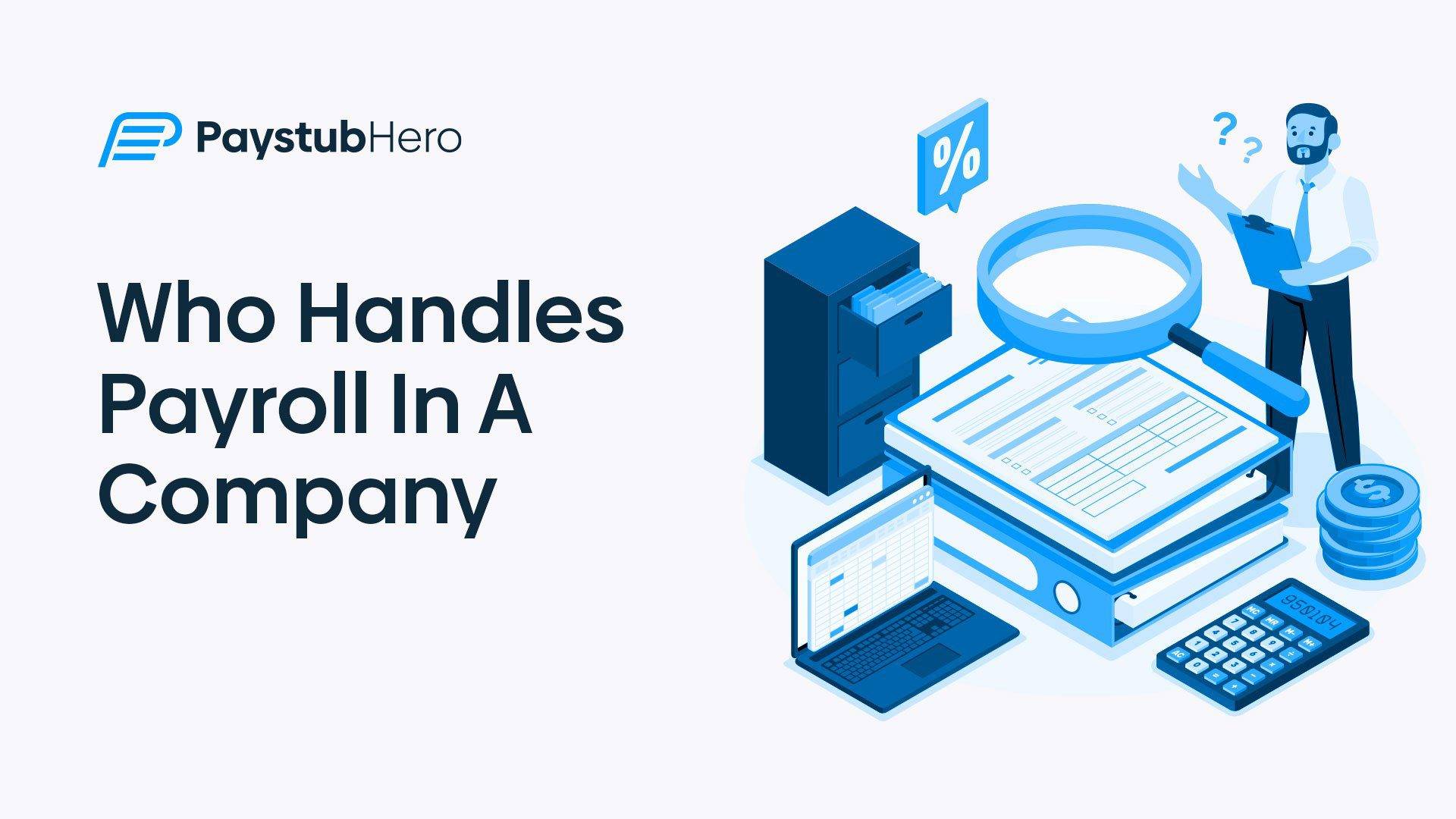In the ever-changing landscape of the business world, one question continues to be of utmost importance: Who handles payroll in a company? This query isn’t simply about designating a task to an employee or department—it’s about entrusting a crucial, sensitive, and intricate aspect of the business’s operation to capable hands.
The one who handles the payroll has the task of managing the financial heartbeat of the company, affecting every other aspect of the business in significant ways.
Payroll is the lifeline that connects a company to its employees—it’s the process that ensures employees receive their due wages for the work they have accomplished. But beyond that, payroll extends to tax compliance, reporting, and auditing, roles that require keen attention to detail and a profound understanding of regulations and tax laws.
While some businesses may overlook the complexity of payroll, understanding its function, importance, and execution is integral to the company’s overall financial health and employee satisfaction.
It can be the defining factor between a business that thrives with content, productive employees, and a company that struggles with staff morale and financial compliance.
Let’s explore the dynamics of payroll management, including what exactly payroll entails, the role of the Human Resources (HR) department, why payroll is a critical aspect of your business, and how paystubs tie into this complex yet crucial system.
Table of Contents:
- Introduction: Who Handles Payroll in a Company?
- Unraveling the Concept: What is Payroll?
- The Human Resources Department: A Strategic Ally Beyond Recruitment
- Beyond the Paycheck: Why is Payroll Important?
- Detailing Earnings and Deductions: The Role of Paystubs in Payroll Management
- Paystubhero: Your Partner in Streamlining Payroll Processes
Unraveling the Concept: What is Payroll?
At its core, payroll is the process of compensating employees for their work—paying them the wages they’ve earned for their time and effort. This seems straightforward, but if you peel back the layers, payroll’s complexity becomes apparent.
Firstly, payroll is not simply a list of employees alongside their corresponding salaries. It’s a dynamic system that tracks each employee’s working hours, noting variations such as overtime or under time. It’s in these details where payroll starts to show its multi-faceted nature.
Then, it gets even more complex as it calculates each employee’s gross wages, taking into account variables like varying pay rates, bonuses, commissions, and other forms of compensation. These additions are not uniformly applied and often differ from one employee to another, adding another layer of complexity to payroll management.
Payroll also encompasses the deductions made from each employee’s gross pay. These deductions include taxes, social security contributions, health insurance premiums, and possibly even union dues or pension contributions, to name a few.
Again, these deductions are not uniform and depend on a range of factors, including the employee’s salary, location, and personal circumstances.
In essence, payroll is a comprehensive record of employees’ compensation. It’s not just about handing out paychecks but ensuring that the calculated wages align correctly with the hours worked, including any additional earnings and the correct deductions.
Lastly, payroll management isn’t complete without ensuring that all information is properly recorded, stored, and reported to the relevant tax authorities. This means keeping meticulous records and abiding by local and federal tax laws, further emphasizing the need for precise and effective payroll management.
In summary, payroll is a multi-layered, complex process that extends far beyond simply issuing a paycheck. It’s an integral part of the business operation, requiring keen attention to detail, regulatory compliance, and a fundamental understanding of each employee’s specific circumstances.
This leads us to the next question: Who is typically responsible for managing this intricate process?
The Human Resources Department: A Strategic Ally Beyond Recruitment
When it comes to managing employees within an organization, the Human Resources (HR) department typically takes the lead.
While it’s well-known for handling recruitment and managing employee relations, its functions extend far beyond these realms. Among its less recognized but equally significant responsibilities is overseeing the intricate process of payroll.
Often viewed as the heart of an organization, the HR department serves as the hub for managing all employee-related matters. This includes the critical responsibility of ensuring employees receive their rightful wages, that these wages align with contractual agreements, and that all payments adhere to labor laws and standards.
The meticulous process of handling payroll requires HR professionals to account for the wide range of pay rates across the company, keep track of the hours each employee has worked, and accurately calculate the corresponding wages.
But, it doesn’t stop there. Benefits, deductions, and tax obligations also fall under HR’s scope. This includes managing sick leaves, vacation time, health benefits, retirement contributions, and more. It’s a demanding role that requires exceptional attention to detail and comprehensive knowledge of both company policies and employment laws.
Additionally, HR professionals must stay abreast of changing labor laws, tax regulations, and compliance requirements. These aspects can vary not just from country to country, but also from state to state, making the role even more challenging.
Any mistakes in these areas can lead to hefty fines, damage employee trust, and may even result in serious legal repercussions.
In essence, the role of the HR department in payroll management is a balancing act. They need to ensure employees are paid correctly and promptly, maintain records accurately, uphold compliance with all laws and regulations, and contribute to the overall financial stability of the company. All while fostering a positive work environment and upholding employee satisfaction.
So, while the HR department is often associated primarily with recruitment and conflict resolution, its contribution to a company extends far beyond these areas. It plays a pivotal role in managing payroll, thereby directly influencing an organization’s financial stability and its relationship with employees.
Beyond the Paycheck: Why is Payroll Important?
Many might wonder why payroll garners such significant attention within a company’s operations.
After all, isn’t it just about handing out paychecks to employees? The reality, however, is far more complex and the importance of payroll stretches across several pivotal areas of a business.
Firstly, payroll directly impacts an organization’s bottom line. It is usually one of the largest expenses a company incurs and managing it effectively is vital for maintaining financial health. This includes everything from the accurate tracking of employee hours to ensuring all tax obligations are met.
Secondly, payroll plays a significant role in employee satisfaction. Salary is a key motivator for many employees. Ensuring their compensation is accurate, fair, and delivered in a timely manner is essential for maintaining morale and productivity.
Missteps in payroll can lead to disgruntled employees and a dip in their motivation levels, adversely affecting the overall work environment and potentially leading to higher turnover rates.
Beyond maintaining employee satisfaction, payroll’s role extends to shaping a company’s reputation as well. Efficient, error-free payroll processes reflect positively on a company’s operational competence, contributing to its reputation as a reliable and responsible employer. This can play a significant role in attracting and retaining high-quality talent.
Furthermore, payroll is crucial in ensuring a company’s compliance with various legal and tax regulations. From reporting income to governmental agencies to fulfilling tax obligations and maintaining necessary records, the intricacies of payroll management carry significant legal implications.
Failure to manage payroll correctly can result in severe penalties, audits, and in extreme cases, legal actions against the company.
Moreover, accurate payroll processes provide critical data that can inform strategic decision-making. This can include everything from budgeting and forecasting to identifying trends in employee overtime. This kind of data can serve as a valuable tool for business strategy and planning.
In short, the importance of payroll in a company extends far beyond simply compensating employees—it’s a critical aspect of financial management, legal compliance, and overall company reputation.
This highlights the necessity of entrusting its management to skilled, knowledgeable professionals capable of handling its complexities and recognizing its strategic value.
Detailing Earnings and Deductions: The Role of Paystubs in Payroll Management
When diving into the intricacies of payroll, it’s impossible not to acknowledge the vital role paystubs play in the process. Serving as a tangible record of employees’ earnings and deductions, paystubs are not just slips of paper but a pivotal component of comprehensive payroll management.
At the most basic level, a paystub provides a detailed breakdown of an employee’s compensation for a particular pay period. It outlines gross pay, itemizes all deductions such as tax withholdings and insurance premiums, and states the net pay, which is the actual amount the employee receives.
But the significance of a paystub extends far beyond being a receipt for salary payments.
For employees, a paystub offers transparency and allows them to understand exactly how their pay is calculated. It shows them the deductions made, the taxes paid, and if they have any bonus or overtime pay included.
It helps employees to budget, provide proof of income when applying for loans or rental agreements, and to ensure they are being compensated correctly.
For employers, on the other hand, paystubs are a critical record-keeping tool. They provide a detailed account of what the company has paid out in wages, taxes, and other deductions, assisting in bookkeeping and financial management. Additionally, maintaining accurate paystub records can be crucial during tax audits, labor disputes, or when addressing potential payroll inaccuracies.
In a broader context, the information contained in a paystub can also offer valuable insights for strategic planning. Patterns in overtime, fluctuations in deductions, or changes in gross pay can signal trends or raise issues that might need to be addressed at an organizational level.
In essence, paystubs are a cornerstone of effective payroll management, bridging the gap between employers and employees by offering transparency and serving as a reliable record of financial transactions.
Despite their unassuming appearance, paystubs play an indispensable role in the world of payroll, demonstrating the complex interplay of factors that contribute to effective payroll management.
Paystubhero: Your Partner in Streamlining Payroll Processes
Navigating the labyrinth of payroll management can often seem overwhelming, particularly for entrepreneurs, freelancers, small businesses, and independent contractors.
However, with the right tools and partners, even this complex process can be made seamless and hassle-free. Enter Paystubhero, a comprehensive online payroll software designed specifically to cater to your needs.
Paystubhero is more than just an online tool—it’s an ally that helps you simplify and automate your payroll processes.
With a keen understanding of the challenges faced by smaller businesses and individual professionals, Paystubhero aims to level the playing field, offering robust payroll solutions that were once only accessible to larger companies.
With Paystubhero, you get an intuitive, user-friendly platform that makes payroll management as simple as entering your company and employee information. Our software takes care of the rest, handling all calculations, compliance issues, and even generating paystubs. The entire process is designed to be as simple as 1-2-3, freeing you from the hassles of manual payroll management.
But simplicity doesn’t mean sacrificing functionality. Despite its ease of use, Paystubhero is a powerful tool that provides all the features you need for efficient payroll management. It accommodates varying pay rates, different types of deductions, and can handle any changes in tax laws or regulations.
Moreover, Paystubhero is designed with affordability in mind. Understanding the financial constraints often faced by smaller businesses and individual professionals, our solutions provide a cost-effective alternative to more expensive software like ADP or Gusto.
With Paystubhero, you get access to top-tier payroll management tools without breaking the bank.
The combination of simplicity, functionality, and affordability makes Paystubhero a valuable partner for any small business or professional looking to streamline their payroll processes.
With Paystubhero by your side, you can turn the complex task of payroll management into a smooth, efficient process, allowing you to focus more on growing your business and less on administrative tasks.
Ready to simplify your payroll? Join Paystubhero today and let us transform your payroll management experience.
Frequent Asked Questions
- Who is responsible for employee payroll?
- The Human Resources (HR) department is typically responsible for managing employee payroll in a company. However, in some organizations, this responsibility may be shared with or delegated to the accounting department.
- Does HR or accounting handle payroll?
- Both HR and accounting can handle payroll. HR usually manages the details related to employee compensation, benefits, and hours worked. Accounting often handles the financial aspects, such as processing payments and maintaining financial records.
- Should HR be responsible for payroll?
- Yes, HR should ideally be responsible for payroll as it involves managing employee data, a task closely aligned with HR’s functions. However, collaboration with the accounting department is often beneficial for efficient payroll management.
- What do you call a person who does payroll?
- A person who handles payroll is typically referred to as a Payroll Specialist or Payroll Administrator. They may also have titles such as Payroll Clerk or Payroll Manager, depending on their specific role and responsibilities.








